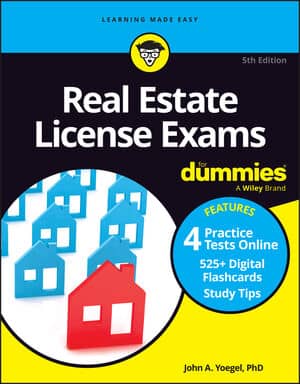The Real Estate License Exam will ask you questions about what happens when the big day finally arrives: the buyer, seller, attorneys, and you, the agent, meet to close on the title to the property. The people who come to a closing, the roles they play, and the specific activities and papers that are signed vary greatly from state to state and even from area to area within a state.
RESPA
The Real Estate Settlement and Procedures Act (RESPA) has to do with closing on the mortgage, which happens at the closing, and simply means signing all the paperwork necessary for the bank to give you, the borrower/buyer, the money that you don’t have for very long because you give it to the seller, and for you to give them the mortgage.
RESPA is a federal law designed to protect consumers who borrow money through a federally related mortgage loan to buy residential properties, including condominiums and cooperative apartments. Although some of the activities required by RESPA take place before the closing, the requirements specifically impact the closing, particularly the preparation of the closing statement.
RESPA is administered by the U.S. Department of Housing and Urban Development. RESPA’s four distinct requirements are:
Required reading: The HUD booklet Buying Your Home: Settlement Costs and Helpful Information must be given to anyone applying for a mortgage loan.
Estimated costs: The lender must give the borrower a good-faith estimate of all settlement costs, or the costs associated with the closing.
HUD Form 1 preparation (closing/settlement statement): When the mortgage loan closes, which is usually at the same time the title to the property is closed, a settlement statement or closing statement of costs must be prepared. The settlement statement must be prepared on a form known as HUD Form 1, which also is called the HUD Uniform Settlement Statement.
Prohibited kickbacks: RESPA prohibits kickbacks. A kickback is an unearned fee.
Allocation of expenses with proration
Proration is the allocation of certain expenses between the buyer and the seller. A variety of costs are associated with buying and selling a piece of property. Part of the settlement at closing is accounting for all the costs and fees in addition to the purchase price, making sure they are paid, and allocating them appropriately to the buyer or seller.
Two accounting words that you need to know when pondering the closing statement are credit and debit.
A credit is an amount owed to the buyer or seller or something for which they’ve already paid.
A debit, on the other hand is a financial transaction that is not in your favor, in the case of a real estate transaction, something that the buyer or seller owes. So the purchase price of the house is a debit to the buyer, because he owes it to the seller.
Various fees differ from state to state. Here are the most common ones so you have some points of reference for getting the additional information you need.
Attorney’s fees
Appraisal fee
Broker’s commission
Loan fees
Recording fees
Survey fees
Tax and insurance reserves
Title expenses
Transfer tax
Two types of payments and costs that are allocated between the buyer and seller at closing are either accrued items or prepaid items.
An accrued item is one that is owed by the seller but is paid by the buyer. Real estate taxes that are paid in arrears (after) is an example of an accrued item. The seller lives in a house where real estate taxes are due December 31 for the entire previous year, a situation in which the taxes are being paid in arrears.
The seller transfers title to the house on June 30 but has paid no taxes for that year. The buyer has to pay the year’s taxes on December 31, but has lived in the house for only six months. The taxes are a prorated item at the closing, meaning the seller and the buyer have to share the costs and payments according to who paid and who used the property.
A prepaid item is one that the seller has paid but from which the buyer benefits. Suppose that taxes are paid in advance, where the seller pays a full year of taxes for the coming year on January 1 but sells the property on June 30.
The seller only enjoys 6 months of his paid taxes. The buyer has paid no taxes for that year, yet lives in the house for six months. This time the buyer owes the seller money.
In many places, real estate agents either calculate prorations or help attorneys or title companies with the calculations. In other places, attorneys or title companies handle the whole thing.
Passing title
At some point after the buyer and seller sign their names on a variety of documents, the seller signs the deed, which is given to the buyer or more likely the buyer’s attorney. Although some things have yet to happen after the closing, title, meaning ownership of the property, is conveyed when the buyer accepts the deed.
Closing in escrow
Closing in escrow involves using a third party, sometimes called an escrow agent, to gather all the documents necessary for the closing and then forward them and money to all the parties involved.
Sellers provide, among other things, a deed, evidence of title, information necessary for either paying off or assuming an existing mortgage, and any other documents necessary to provide a marketable title clear of all defects, encumbrances, and liens. The buyer provides funds for the purchase, mortgage loan documents if any are required, and hazard or other necessary insurance policies.
Escrow agents may be attorneys or representatives of a title or an escrow company. Real estate brokers can offer escrow services but not in transactions in which they’re directly involved.

